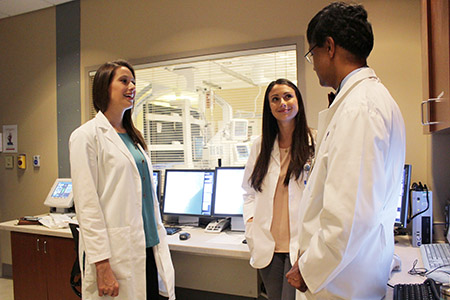First class of physician assistant graduates help improve health care access
Posted on: July 19, 2019; Updated on: July 19, 2019
By Alyssa Yancey, alyssa.yancey@uscmed.sc.edu, 803-216-3302

Physician assistant studies alumna Alexandra Vezzetti, '19, (left) and Rachel Mascari, second-year medical student, observe a catheterization procedure with Souvik Sen, chair of the neurology department in the School of Medicine.
Physician assistant studies graduate Alexandra Vezzetti likes to be a trailblazer. In 2016, she became a member of the first class of physician assistant students at the University of South Carolina School of Medicine Columbia.
Then, last fall, she was the first physician assistant student to rotate through the neurology department of Neurology at Prisma Health. Department Chair Souvik Sen, M.D., was so impressed with Vezzetti that he hired her, and next month, she’ll become the department’s first physician assistant.
In fact, the entire first class of UofSC physician assistant students left an impression across the Prisma Health system. Of the first 19 graduates, nine have already accepted positions at Prisma Health.
“When our class was rotating through the various clinical rotations and sites, everyone said, ‘Come talk to us after you graduate,’ because they very much need an extra person who can fill a lot of different roles,” Vezzetti says.
These graduates are vital to helping improve access to quality health care, especially as the nation faces an acute physician shortage. Additional providers are particularly important in high-need areas like stroke neurology. In 2017, South Carolina had the sixth-highest stroke death rate in the nation, and stroke hospitalization charges totaled more than $992 million in South Carolina alone.
“Neurology may have been an unintended rotation, but it was such a blessing in disguise.”
Alexandra Vezzetti, Physician Assistant Studies, Class of 2019
Sen, who was Vezzetti’s preceptor during her rotation and will be her supervising physician, says he is optimistic the physician assistant model will help improve access to care.
“Our department sees the highest volume of neurology patients in South Carolina,” Sen says. “My hope is that we’ll be able to eventually have as many physician assistants as we have physicians, so we can see more of our patients after they leave the hospital and see them more quickly.”
Vezzetti, who is a native of Rock Hill, South Carolina, and earned her undergraduate degree from Clemson University, was planning to pursue a rotation in pulmonology and critical care, but when the rotation fell through, she decided to try neurology.
“Neurology was the only rotation where I volunteered to stay late to see a patient case,” Vezzetti says. “We had a really interesting stroke patient that wasn’t scheduled to get in until 5:15. Dr. Sen said I was welcome to leave, but I wanted to stay. I ended up staying until 6:30 or 7.
“Those stroke patients really stuck in my mind. Seeing the detrimental effects that they were experiencing, but then following them through their stay and seeing them regain strength, dexterity and language was rewarding. I did a pulse check with myself as I went through my rotations and nothing clicked as well as neurology did.”
As the department’s first physician assistant, Vezzetti will be seeing stroke patients in the hospital, as well as doing outpatient stroke and headache follow-ups. She acknowledges the significant need for neurology providers and looks forward to laying the groundwork for a robust advanced practice provider program within the department.
“We’re in the buckle of the stroke belt. We have so many strokes and a vast shortage of stroke neurologists, and neurologists in general,” Vezzetti says. “Neurology may have been an unintended rotation, but it was such a blessing in disguise.”
Learn more
Learn more about the physician assistant program on the School of Medicine website.
Share this Story! Let friends in your social network know what you are reading about